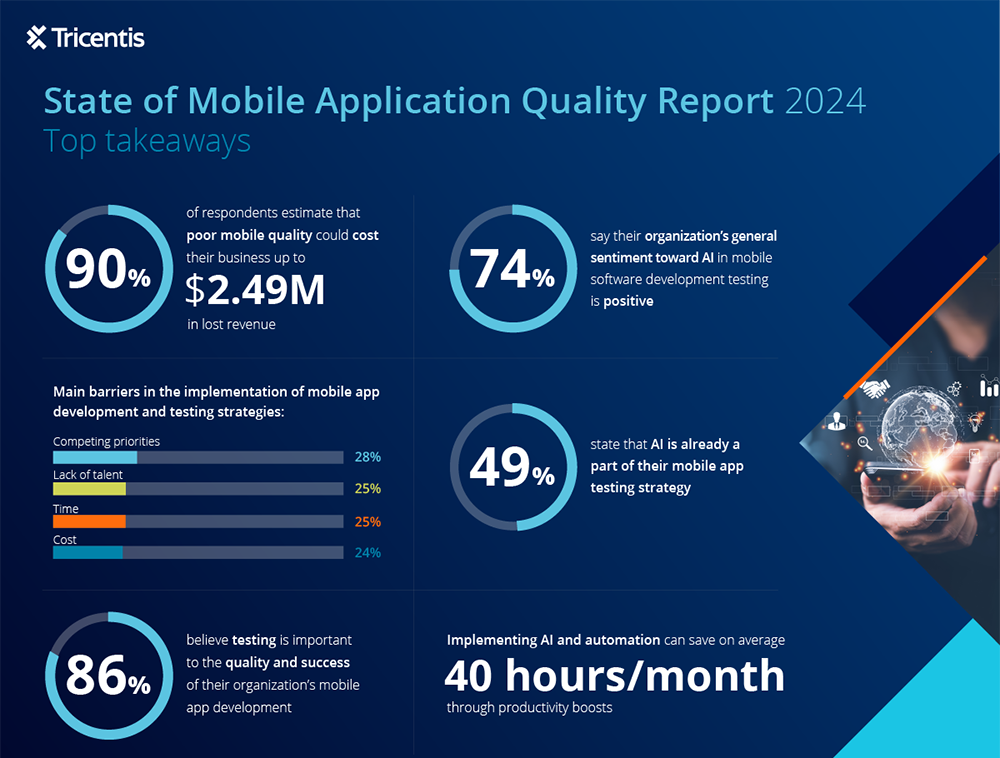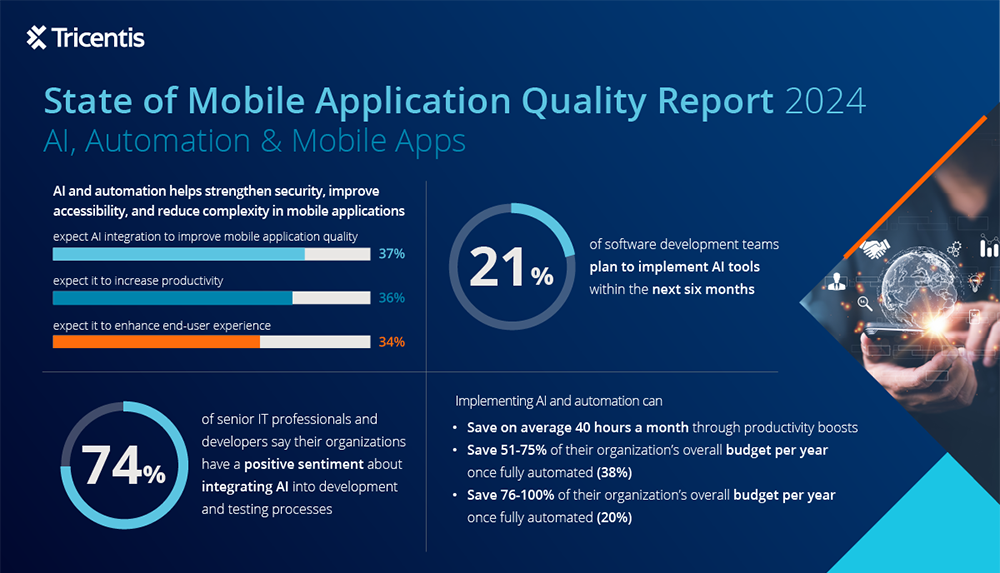Tricentis’ State of Mobile Application Quality Report 2024 reveals AI and low-code/no-code automation address main business priorities, including productivity, user retention and increasing revenue.
Tricentis, a global leader in continuous testing and quality engineering, has released the findings of a new global survey on the importance of mobile application quality and testing, with emphasis on the potential impact of AI and low-code/no-code automation.

Among the key findings are:
- While the majority (87%) of senior IT professionals and application developers state that mobile application quality is critical to their business, 90% of respondents estimate that poor mobile application quality costs their business up to US$2.49M in lost revenue per year.
- Competing priorities (28%), lack of technology and talent (25%), time (25%), and cost (24%) are cited as key challenges in the implementation of mobile app development and testing strategies.
- AI and low-code/no-code tools are viewed as potential solutions to improve mobile application quality, and global businesses expect their use to save one working week of productivity a month (40 hours) on average when compared to traditional, manual processes.
Tricentis’ State of Mobile Application Quality Report 2024, which surveyed the behaviours and attitudes of more than 1,000 senior IT professionals and developers in the US, Germany, Singapore and the UK, explores the effect of poor application quality and manual testing on businesses’ profitability, as well as the surge of AI adoption in mobile testing strategies.
Bad app quality and manual app testing impact businesses’ profitability
Nearly all of those surveyed (86%) deem testing important to the quality and success of their organisation’s mobile app development, however, just over a quarter (27%) believe their organisation’s current mobile app development and testing strategy exceeds expectations.
This may be explained by the fact that nearly half (47%) of those surveyed also state they currently use manual testing for mobile applications. Almost two in five (38%) of senior IT professionals and application developers think they would save between half and three-quarters (51%-75%) of their organisation’s budget per year by moving toward fully automated mobile application testing, and a further fifth (20%) expect they would save anywhere between 76%-100% of their budget per year.

Respondents also expect to achieve increased revenue (31%), improved productivity (32%), increased user retention (28%), and increased compatibility across devices (28%) through improved mobile application quality and testing. These benefits may be the reason that, in the next 12 months, 32% of respondents expect their organisation to invest upwards of over US$1 million.
“With over seven million apps available across iOS and Android platforms, organisations today need to move fast and deliver seamless, quality mobile experiences with confidence,” said Mav Turner, Chief Product and Strategy Officer at Tricentis. “To keep up, mobile development teams need to test apps and features quickly. Automation, powered by AI and low-code/no-code solutions meets this challenge, so teams can create and execute tests faster, bring about better application quality and ultimately deliver better value for the companies they work for and the end-users that they serve.”
Rise of AI adoption in mobile testing addresses core challenges
Almost three quarters (74%) of those surveyed say their organisation’s general sentiment toward AI in mobile software development testing is positive and they are recognising its value. Nearly half (49%) state that AI is already a part of their mobile app testing strategy and another fifth (21%) plan to implement it within the next six months.
Those who are not using AI as part of their mobile testing strategy are almost twice as likely to face challenges around lack of talent and upskilling and are also more likely to cite a lack of technology resources when it comes to the implementation of their mobile app development and testing strategy.
Respondents also expect AI integration to improve mobile application quality (37%), increase productivity (36%), enhance end-user experience (34%) and to reduce the number of vulnerabilities and/or bugs (32%).
Those using AI as part of their mobile testing strategy are also much more likely to state that all services and information within their organisation are mobile accessible when compared to those who are not (44% vs 8%).
“For organisations looking to implement artificial intelligence to boost their business objectives, testing is a fantastic place to start,” said David Colwell, Vice President of AI and ML at Tricentis. “Mobile application testing is a great use case for AI because not only does it have multiple benefits – including significant time and cost savings, as well as quality improvement and risk reduction – but also its impact can be accurately measured.”
“At Tricentis, we are committed to creating and embedding responsible AI into every phase of the software testing life cycle. From design, creation, execution and analysis, our AI solutions meet the security, performance and compliance standards for all applications today, in order to solve real-world business problems and improve customer experiences.”
Click below to share this article

